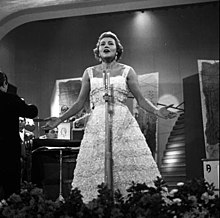Nilla Pizzi
In 1942, she won a competition for new voices organized by EIAR, the Italian radio broadcaster, in front of ten thousand competitors, where she interpreted the songs "Tu musica divina" by Alberto Rabagliati, and "Domani non mi aspettar" by Oscar Carboni.
Her first album for Parlophon was recorded on February 20, 1944, dueting with Bruna Rattani in "Valzer di primavera" and accompanying Elsa Peyrone in "Ronda solitaria".
Either way, she was removed from the radio after a negative judgment handed down by the maestro Tito Petralia in the spring of 1944, as her voice was allegedly considered too sensual and exotic for the Fascist regime.
In 1951 she won the first Sanremo Music Festival with "Grazie dei fiori", also finishing second with "La luna si veste d'argento", sung in duet with Achille Togliani.
In the same year, the Italian version of the hit "Cherry Pink (and Apple Blossom White)", titled "Ciliegi rosa", was quite successful.
The following year she triumphed again at the Sanremo Festival conquering the entire podium (first, second and third place) respectively with "Vola colomba", "Papaveri e papere", and "Una donna prega", which remains a record to this day never equaled by any other singer (since 1967, every entrant in the event must perform only one competing song).
She was dubbed "the Queen of Italian Music" and her songs are deemed to have marked an era: "Vola colomba" accompanied the return of Trieste to Italy while "Papaveri e papere" sold 75,000 copies, was translated into over forty languages and became a classic of Italian music (with a version also being recorded by the famous tenor Beniamino Gigli), despite the original lyrics having been censored due to overt political allusions.
She also embarked on a tour of Russia with Paolo Bacilieri, from which she brought to Italy the songs "Kira" and "Podmoskovnyye vechera" ("Midnight in Moscow"), recorded with the Roman New Orleans Jazz Band of Carlo Loffredo.
In 1960, she returned to the Sanremo Festival and entered the song "Colpevole" in couple with Tonina Torrielli, ranking fourth, whilst her other entry "Perdoniamoci" was eliminated before the final.
Starting from this period, the contrast of the ever-growing rock and roll and beat with Pizzi's traditional melodic song caused her to be set aside by record companies.
The club was reportedly attended by other big names such as Frank Sinatra, Sammy Davis Junior, Curd Jürgens, and Caterina Valente.
She then received the prestigious Grande Cervo d'Oro award from the Libyan government and in 1965 she won the Sandrigo Festival, in the province of Vicenza, with the Venetian-language song "Ti, te se timido".
In the same year she returned to work as an actress: directed by Alberto Lattuada she played Sostrata in the film adaptation of Machiavelli's The Mandrake, alongside Totò, Romolo Valli, Rosanna Schiaffino and Philippe Leroy.
Another successful tour of the United States took place in 1968, during which she performed alongside Frank Sinatra, Ella Fitzgerald, Perry Como and Rosemary Clooney.
In 1981 Gianni Ravera called her to present the Sanremo Festival, alongside Claudio Cecchetto and Eleonora Vallone; Pizzi was the official madrina ("godmother") of the event on the thirtieth anniversary of the first edition.






